
Winter Olympics: how the drug found in Kamila Valieva’s sample, trimetazidine, enhances performance in sports
- The Russian figure skater, Chinese swimmer Sun Yang and American swimmer Madisyn Cox all tested positive for the banned substance
- The substance was added to Wada’s banned list in 2014, months before Sun tested positive for it, for which he served a three-month ban
Trimetazidine is a drug used to prevent or treat angina attacks – a type of chest pain caused by reduced blood flow to the heart—and other heart-related conditions. It works by increasing blood flow to the heart and limits rapid spikes in blood pressure.
It has been on Wada’s list of prohibited substances since 2014, first as a stimulant but was then reclassified under the “hormone and metabolic modulator” category the following year. It remains on the 2022 banned list as a metabolic modulator.
It is illegal for athletes to use in and out of competition because of evidence of performance enhancement. Although it does not have the muscle building or stimulant-like effects of many commonly recognised performance-enhancing drugs, trimetazidine may enhance athletes’ physical efficiency and endurance.

The drug can also affect metabolism in a way that can improve skeletal muscle or heart performance and this kind of improvement in endurance is crucial for athletic performance.
Typically, when used as a performance-enhancing drug, trimetazidine starts to work within hours of swallowing a single dose, and the clinical effects can last for days. It may be detected in athletes’ urine for several days after their last use of the drug.
On February 7, Kamila Valieva of the Russia Olympic Committee led her compatriots to gold in the figure skating team event after finishing first in the last event – women’s single skate. However, no medal ceremony was held after it was discovered the 15-year-old tested positive of trimetazidine in her urine sample taken at the Russian Nationals in late December.
The New York Times later reported Valieva’s sample also tested positive for two other drugs: hypoxen and L-carnitine, which are not on the banned list. The combination of these drugs with trimetazidine has been called a “trifecta of substances”, which seem to be aimed at increasing endurance, reducing fatigue and promoting greater efficiency in using oxygen.
Valieva was not the first prominent athlete that failed the same doping test.
In May 2014, Chinese Olympic champion swimmer Sun Yang tested positive of trimetazidine, which had been newly banned four months earlier and classified as a prohibited stimulant by Wada.

Sun was banned by the Chinese Swimming Association for three months but the Chinese authorities did not release the news until the star swimmer returned from the Incheon Asian Games in October. Sun won three gold and one silver medals for China at the Games but was never questioned by the media about his suspension because no one knew he just completed a ban.
In 2018, American swimmer Madisyn Cox, a gold medallist at the World Championships in Budapest the year before, was banned from competition for six months after a urine sample tested positive for trimetazidine. Swimming world body Fina initially reduced her suspension from four years to two years because of Cox’s testimony that she did not knowingly ingest the drug.
Upon analysis of opened and sealed bottles of Cooper Complete Elite Athletic multivitamins, the Court of Arbitration for Sport (CAS) determined that the multivitamins were the source, and reduced Cox’s suspension to six months.

Valieva was not the first well-known Russian athlete that failed the drug test under “metabolic modulator” category. In 2016, tennis star Maria Sharapova, a five-time grand slam singles champion and former world number one, received a two-year suspension from the International Tennis Federation after testing positive for the banned drug meldonium from a sample taken in the Australian Open early that year.
Meldonium only became a prohibited substance by Wada on January 1, 2016 but Sharapova has taken it for 10 years to help with health problems. Her suspension was later reduced to 15 months following an appeal to the CAS which ruled the player had “no significant fault” but had to bear some degree of blame.

